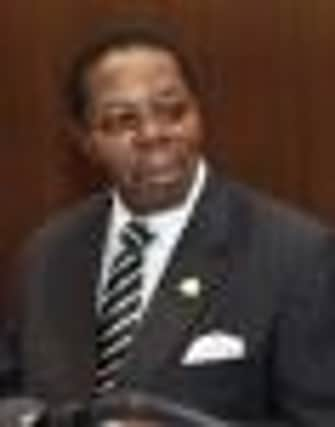Obituary: Bingu wa Mutharika; once feted Malawian president who turned into a repressive despot in just a few years


Bingu wa Mutharika, for eight years the president of Malawi – twinned with Scotland in a special relationship stemming historically from the huge influence wielded by the Church of Scotland in the central African country – has died with few tears shed for him among Malawians. The country’s small, green and sleepy capital, Lilongwe, where menace had hung in the air, became a scene of rejoicing following the confirmation of Mutharika’s death at the age of 78. “As Christians, we are not supposed to celebrate death,” said Whyson Chitete, a businessman waiting in a long queue for petrol in Lilongwe. “But this one is different.”
Mutharika came to power in 2004 on a wave of democratic and economic optimism, but he evolved into a stereotypical arrogant and paranoid African autocrat. Last year, at least 20 people were killed by Mutharika’s security forces when unprecedented anti-government protests turned violent, some shot in the back as they ran.
Advertisement
Hide AdAdvertisement
Hide AdHuman rights organisations and journalists reported beatings and persecution of activists who criticised the increasingly dictatorial president. A University of Malawi lecturer who addressed the Egyptian revolution was arrested, detained and lost his job.
New laws introduced by the president, who was planning an unconstitutional third term in office or to put his brother Peter in power, threatened to close newspapers and allow police to search homes without a warrant. His behaviour invited ugly comparison with Hastings Kamuzu Banda, the Edinburgh-educated medical doctor who ruled Malawi with an iron fist in its first three decades of independence.
For a short period, early in Mutharika’s presidency, Malawi was feted – not least by former Scottish first minister Jack McConnell – as a beacon of democracy and good governance, and in 2009 Bingu won re-election by a landslide.
“But then he completely changed, became a different person”, says Undule Mwakasungula, executive director of Malawi’s only human rights organisation, the Centre for Human Rights Rehabilitation, and once a Mutharika sympathiser. “He became arrogant and wanted to fight everybody. He talked about reconciliation, but attacked individuals.”
The Africa branch of George Soros’s Open Society Initiative said Mutharika “closed Malawi’s once vibrant democratic space in a blatantly anti-constitutional fashion. Almost every constitutionally-guaranteed freedom was under attack – from free speech to free association to academic freedom. Court rulings were regularly ignored, while critical constitutional bodies were deliberately sabotaged.”
The Open Society said that after years of piecemeal progress Malawi’s hard-fought democratic gains were being reversed by Mutharika before his death at a rapid rate and continuing to deteriorate. Among oppressive laws he introduced were those criminalising gay and lesbian sex: one homosexual couple were sentenced to 14 years imprisonment. “Clearly, Malawi [under Mutharika] was heading in the wrong direction towards an authoritarian era when the will of the people was being subordinated to the dictatorial whims of one man.”
Mutharika became a close ally of neighbouring president Robert Mugabe of Zimbabwe, and critics accused him of leading his country down a similar disastrous path to that of Zimbabwe.
Mutharika was born in Thyolo, in southern Malawi, where his father and mother were teachers at a Church of Scotland mission station. He was christened Ryson Webster Thom, but adopted his African name in the 1960s. He also became a Roman Catholic.
Advertisement
Hide AdAdvertisement
Hide AdAfter obtaining an economics degree in India and then a PhD in the United States, he worked for the World Bank and the United Nations Economic Commission for Africa before becoming secretary-general of the 22-nation Common Market for Eastern and Southern Africa.
When Elson Muluzi became president in Malawi’s first democratic election, following the death of the dictator Hasting Banda, he appointed Mutharika minister of economic planning and development and groomed him to become his successor.
Muluzi stepped down voluntarily from power in 2004, but when he apologised to Malawians for choosing Mutharika as his successor “and imposing him on the country”, Mutharika placed him under house arrest, calling him a coward and accusing him of treason.
During his first term in office, from 2004 to 2009, Mutharika was widely praised for his free market reforms and for helping millions of the country’s poor farmers by subsidising agricultural inputs. But relations began to sour when international donors began warning that the government could not afford the full scale of the programme.
They came to a head in April last year when Fergus Cochrane-Dyet, the British High Commissioner to Malawi (a post to which McConnell, made a tribal chief by Mutharika, hoped to be appointed after resigning in 2007 as Labour leader in the Scottish Parliament), was expelled by Mutharika. The expulsion followed the leaking of a diplomatic cable in which Cochrane-Dyet said the Malawian head of state was becoming “ever more autocratic and intolerant of criticism”.
Britain promptly severed aid to Malawi worth £350 million, and other foreign donors followed suit, blocking financial flows accounting for 40 per cent of Malawi government spending. The United States shelved a £225m programme to overhaul the country’s dilapidated power grid. Mutharika reacted by telling foreign donors “to go to hell”, accusing them of plotting with opponents to topple his country.
As aid evaporated, fuel supplies dried up and food prices soared, leading to popular unrest and widespread attacks on Mutharika’s economic and other policies. Critics said he had not so much run the country as run the country into the ground.
Ambassador Cochrane-Dyet has yet to return to Malawi, but is likely to do so now as Mutharika’s successors seek to rebuild bridges with the outside world.
Advertisement
Hide AdAdvertisement
Hide AdMutharika died after suffering a heart attack. His first wife, Ethel Zvauya, a Zimbabwean, died in 2007. He is survived by their four children and by his second wife, Callista Chapola-Chimambo.
FRED BRIDGLAND